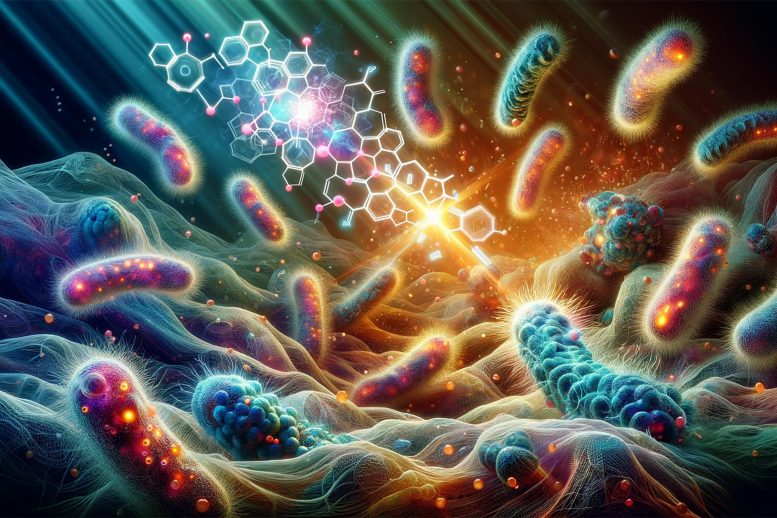
Dr. Quentin Michaudel and his research team have created a new family of polymers capable of killing bacteria without inducing antibiotic resistance — a major step in the fight against superbugs like E. coli and MRSA.
Antibiotic-resistant bacteria have become a rapidly growing threat to public health. Each year, they account for more than 2.8 million infections, according to the U.S. Centers for Disease Control and Prevention. Without new antibiotics, even common injuries and infections harbor the potential to become lethal.
Scientists are now one step closer to eliminating that threat, thanks to a Texas A&M University-led collaboration that has developed a new family of polymers capable of killing bacteria without inducing antibiotic resistance by disrupting the membrane of these microorganisms.
“The new polymers we synthesized could help fight antibiotic resistance in the future by providing antibacterial molecules that operate through a mechanism against which bacteria do not seem to develop resistance,” said Dr. Quentin Michaudel, an assistant professor in the Department of Chemistry and lead investigator in the research, published on December 11 in the Proceedings of the National Academy of Sciences (PNAS).
Working at the interface of organic chemistry and polymer science, the Michaudel Laboratory was able to synthesize the new polymer by carefully designing a positively charged molecule that can be stitched many times to form a large molecule made of the same repeating charged motif using a carefully selected catalyst called AquaMet. According to Michaudel, that catalyst proves key, given that it has to tolerate a high concentration of charges and also be water-soluble — a feature he describes as uncommon for this type of process.
After achieving success, the Michaudel Lab put its polymers to the test against two main types of antibiotic-resistant bacteria — E. coli and Staphylococcus aureus (MRSA) — in collaboration with Dr. Jessica Schiffman’s group at the University of Massachusetts Amherst. While awaiting those results, the researchers also tested their polymers’ toxicity against human red blood cells.
“A common issue with antibacterial polymers is a lack of selectivity between bacteria and human cells when targeting the cellular membrane,” Michaudel explained. “The key is to strike a right balance between effectively inhibiting bacteria growth and killing several types of cells indiscriminately.”
Michaudel credits the multidisciplinary nature of scientific innovation and the generosity of dedicated researchers across the Texas A&M campus and country as factors in his team’s success in determining the perfect catalyst for their molecule assembly.
“This project was several years in the making and would not have been possible without the help of several groups, in addition to our UMass collaborators,” Michaudel said. “For instance, we had to ship some samples to the Letteri Lab at the University of Virginia to determine the length of our polymers, which required the use of an instrument that few labs in the country have. We are also tremendously grateful to [biochemistry Ph.D. candidate] Nathan Williams and Dr. Jean-Philippe Pellois here at Texas A&M, who provided their expertise in our assessment of toxicity against red blood cells.”
Michaudel says the team will now focus on improving the activity of its polymers against bacteria — specifically, their selectivity for bacterial cells versus human cells — before moving on to in vivo assays.
“We are in the process of synthesizing a variety of analogs with that exciting goal in mind,” he said.
Reference: “Ring-opening metathesis polymerization of N-methylpyridinium-fused norbornenes to access antibacterial main-chain cationic polymers” by Sarah N. Hancock, Nattawut Yuntawattana, Emily Diep, Arunava Maity, An Tran, Jessica D. Schiffman and Quentin Michaudel, 11 December 2023, Proceedings of the National Academy of Sciences.
DOI: 10.1073/pnas.2311396120
The team’s paper, which features Michaudel Lab member and Texas A&M chemistry Ph.D. graduate Dr. Sarah Hancock ’23 as first author, can be viewed online along with related figures and captions. Other key contributors from the Michaudel Lab are chemistry graduate student An Tran ’23, postdoctoral scholar Dr. Arunava Maity and former postdoctoral scholar Dr. Nattawut Yuntawattana, who is now an assistant professor of materials science at Kasetsart University in Thailand.
This research was funded primarily by Michaudel’s National Institutes of Health Maximizing Investigators’ Research Award (MIRA) through the National Institute of General Medical Sciences.
A native of La Rochelle, France, Michaudel joined the Texas A&M Chemistry faculty in 2018 and holds a joint appointment in the Department of Materials Science and Engineering. In addition to an NIH MIRA in 2020, his career honors to date include a 2022 National Science Foundation Faculty Early Career Development (CAREER) Award, a 2022 American Chemical Society Polymeric Materials: Science and Engineering (PMSE) Young Investigator Award and a 2021 Thieme Chemistry Journals Award.
1 Comment
Marvelous